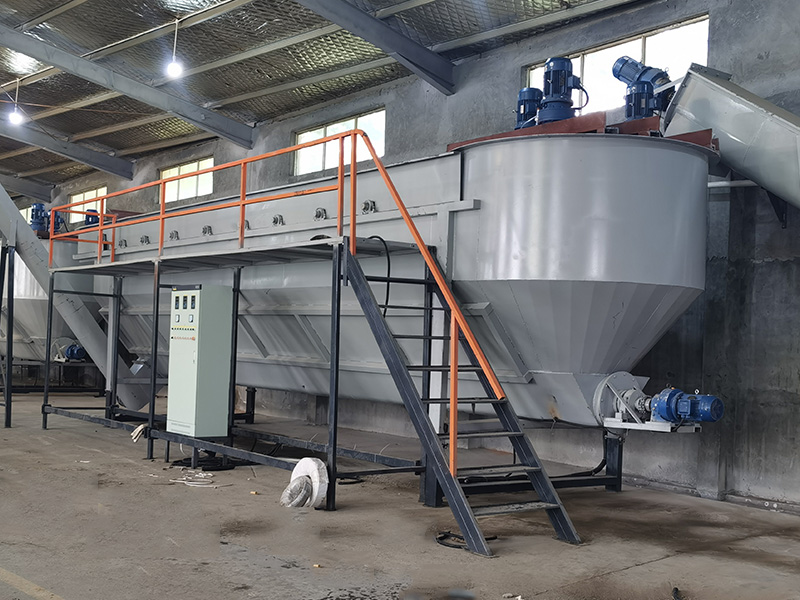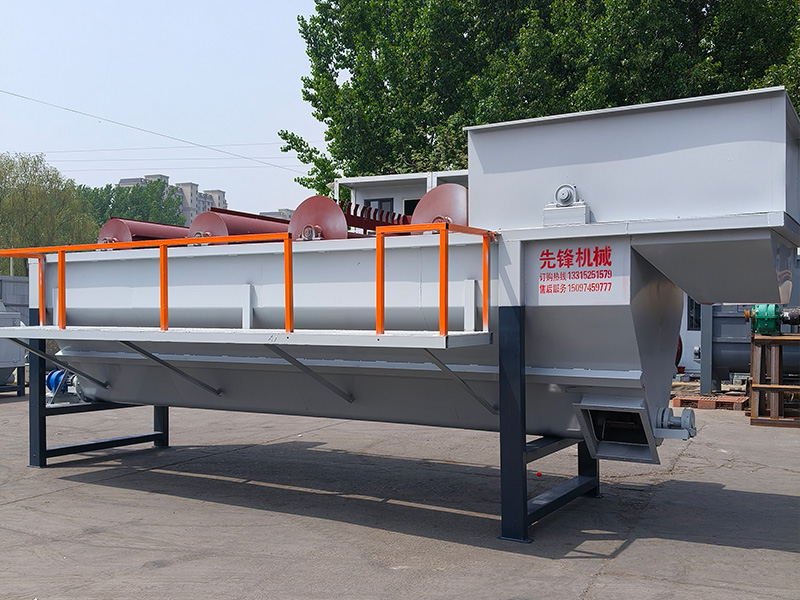Revolutionizing Plastic Recycling: The Benefits of Customized Flotation Tanks
Revolutionizing Plastic Recycling: The Benefits of Customized Flotation Tanks
Table of Contents
Introduction to Plastic Recycling and Flotation Tanks
What Are Flotation Tanks?
The Importance of Plastic Recycling in Today's World
Benefits of Customized Flotation Tanks in Plastic Recycling
Enhanced Efficiency and Productivity
Cost-Effectiveness of Ta
Jun 03,2025

Revolutionizing Plastic Recycling: The Benefits of Customized Flotation Tanks
Table of Contents
- Introduction to Plastic Recycling and Flotation Tanks
- What Are Flotation Tanks?
- The Importance of Plastic Recycling in Today's World
- Benefits of Customized Flotation Tanks in Plastic Recycling
- Enhanced Efficiency and Productivity
- Cost-Effectiveness of Tailored Solutions
- Positive Environmental Impact
- Technological Innovations in Customized Flotation Tanks
- Case Studies: Successful Implementation of Customized Flotation Tanks
- The Future of Plastic Recycling with Customized Solutions
- Conclusion
- Frequently Asked Questions (FAQs)
Introduction to Plastic Recycling and Flotation Tanks
Plastic recycling is a crucial aspect of modern waste management, aimed at reducing environmental impact while promoting sustainability. As the demand for effective recycling solutions increases, industries are continually seeking innovative methods to improve their processes. One such advancement is the introduction of **customized flotation tanks**. These specialized tanks play an essential role in enhancing the efficiency and effectiveness of plastic recycling.
Flotation tanks work on the principle of separating materials based on their density, making them an invaluable asset in recycling operations. This article explores the many benefits of customized flotation tanks, highlighting how they revolutionize plastic recycling and contribute to a cleaner, more sustainable planet.
What Are Flotation Tanks?
Flotation tanks are large vessels designed to facilitate the separation of materials, primarily through the process of flotation. In recycling, they are used to separate plastics from contaminants and other materials based on their buoyancy. This process involves introducing air bubbles into the tank, which attach to the plastic particles, allowing them to float to the surface, where they can be easily removed.
The customization of these tanks involves tailoring their design, size, and operational parameters to meet specific recycling needs. Customized flotation tanks can effectively handle diverse plastic types, enhancing separation effectiveness while minimizing waste.
The Importance of Plastic Recycling in Today's World
The importance of plastic recycling cannot be overstated. With millions of tons of plastic waste generated each year, effective recycling is essential for several reasons:
1. **Environmental Protection**: Recycling plastic reduces the amount of waste sent to landfills and minimizes pollution.
2. **Resource Conservation**: Recycling helps conserve natural resources by repurposing existing materials rather than extracting new ones.
3. **Energy Savings**: The energy required to recycle plastics is significantly lower than that needed to produce new plastics.
4. **Economic Growth**: A robust recycling industry generates jobs and promotes economic development while fostering innovation.
Custom-designed flotation tanks enhance plastic recycling processes, making them more efficient and environmentally friendly.
Benefits of Customized Flotation Tanks in Plastic Recycling
Customized flotation tanks bring a plethora of advantages to the plastic recycling process. Below, we delve into the key benefits that make these tanks indispensable for modern recycling facilities.
Enhanced Efficiency and Productivity
One of the most significant benefits of customized flotation tanks is their enhanced efficiency. By tailoring the size and design of the tanks to specific types of plastics and contaminants, recycling facilities can achieve:
- **Faster Processing Times**: Customized tanks can be designed to optimize flow rates, allowing for quicker separation and processing of materials.
- **Improved Recovery Rates**: By fine-tuning the flotation process, facilities can recover a higher percentage of recyclable plastics, reducing waste.
- **Less Downtime**: Tailored solutions can address common bottlenecks in the recycling process, leading to reduced downtime and increased productivity.
Cost-Effectiveness of Tailored Solutions
Investing in customized flotation tanks can lead to significant cost savings over time. The advantages include:
- **Reduced Operating Costs**: Enhanced efficiency means lower energy consumption and reduced wear and tear on equipment.
- **Lower Labor Costs**: With more effective separation processes, fewer personnel are required for manual sorting, leading to labor cost savings.
- **Minimized Waste Disposal Fees**: Increased recovery rates reduce the volume of waste sent to landfills, ultimately lowering disposal costs.
Positive Environmental Impact
Customized flotation tanks contribute to a more sustainable recycling process, positively impacting the environment in several ways:
- **Lower Carbon Footprint**: Efficient recycling processes reduce emissions associated with plastic production and waste disposal.
- **Waste Reduction**: Higher recovery rates mean that more plastics are diverted from landfills, leading to a cleaner environment.
- **Promotion of Circular Economy**: By facilitating the recycling of plastics, customized flotation tanks support the transition toward a circular economy, where materials are reused and repurposed rather than discarded.
Technological Innovations in Customized Flotation Tanks
The evolution of flotation tank technology has led to remarkable innovations that enhance their effectiveness in plastic recycling. Key innovations include:
- **Advanced Materials**: The use of durable and resistant materials in tank construction improves longevity and performance.
- **Automated Systems**: Integrating automation in flotation processes allows for real-time monitoring and adjustments, optimizing efficiency.
- **Smart Technology**: Incorporating sensors and data analytics enables better control over flotation dynamics, leading to improved separation outcomes.
These advancements ensure that customized flotation tanks remain at the forefront of plastic recycling technology.
Case Studies: Successful Implementation of Customized Flotation Tanks
Several recycling facilities have successfully integrated customized flotation tanks into their operations, yielding significant improvements. Here are a few noteworthy case studies:
- **Case Study 1: Resource Recovery Facility**
A resource recovery facility tailored its flotation tanks to handle multi-layer plastics. As a result, they achieved a 30% increase in recovery rates, significantly reducing plastic waste sent to landfills.
- **Case Study 2: Industrial Plastics Recyclers**
An industrial recycler customized flotation tanks to separate specific polymer types. This led to a 25% reduction in operational costs and improved overall productivity.
- **Case Study 3: Community Recycling Program**
A community recycling initiative adopted customized flotation tanks, enhancing participation and recovery rates among residents. They reported a 40% increase in recycled plastics, reinforcing community engagement in sustainability efforts.
These case studies illustrate the tangible benefits and transformative potential of customized flotation tanks in the recycling industry.
The Future of Plastic Recycling with Customized Solutions
As the demand for effective plastic recycling solutions continues to rise, the future looks promising for customized flotation tanks. Innovations in technology, materials, and operational practices will further enhance their capabilities. Moreover, as industries increasingly commit to sustainability, the adoption of tailored solutions will likely become the norm in recycling practices.
Investments in research and development will propel the evolution of flotation tank technology, ensuring that they meet the ever-changing demands of the plastic recycling landscape. The integration of artificial intelligence and machine learning can further optimize the separation process, making customized flotation tanks even more efficient.
Conclusion
Customized flotation tanks are revolutionizing the plastic recycling industry, offering significant benefits in efficiency, cost-effectiveness, and environmental impact. As we continue to face the challenges posed by plastic waste, investing in tailored solutions becomes essential for effective recycling practices. With ongoing technological advancements, the future of customized flotation tanks is bright, promising to enhance the sustainability of plastic recycling and contribute to a cleaner, healthier planet.
Frequently Asked Questions (FAQs)
1. What types of plastics can be processed using customized flotation tanks?
Customized flotation tanks can be designed to handle various types of plastics, including PET, HDPE, PVC, and multi-layered materials, ensuring effective separation based on density and buoyancy.
2. How do customized flotation tanks improve recycling efficiency?
By tailoring the size, design, and operational parameters of flotation tanks to specific types of plastics and contaminants, recycling facilities can achieve faster processing times, improved recovery rates, and reduced downtime.
3. Are customized flotation tanks environmentally friendly?
Yes, customized flotation tanks promote a more sustainable recycling process by increasing recovery rates, reducing waste sent to landfills, and lowering carbon emissions associated with plastic production and disposal.
4. What are the cost benefits of using customized flotation tanks?
The use of customized flotation tanks can lead to reduced operating costs, lower labor expenses, and minimized waste disposal fees, ultimately resulting in significant long-term savings for recycling facilities.
5. How will future innovations impact customized flotation tanks?
Future innovations, such as advanced materials, automation, and smart technology, will enhance the performance and effectiveness of customized flotation tanks, making them even more integral to the plastic recycling process.
TAG:
Contact Us
E-mail :
Phone/WhatsApp:
Address:
Shunping, Baoding City, Hebei Province









